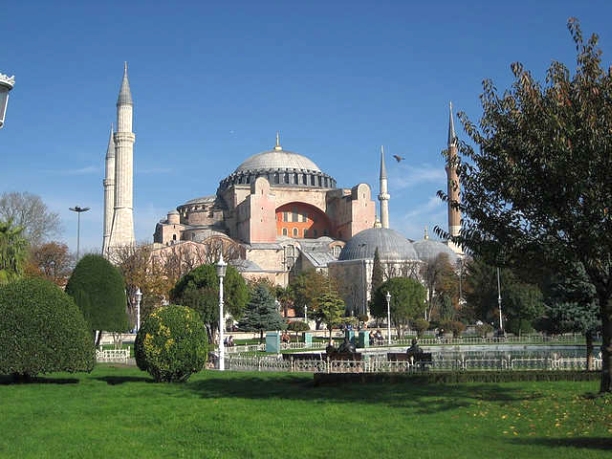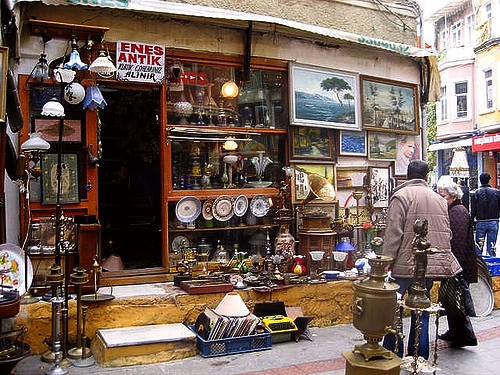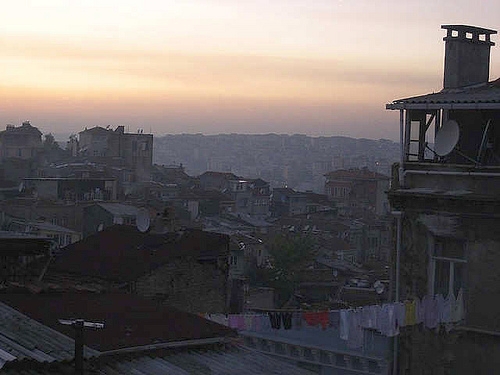Teaching English In Turkey: My Experience As An EFL Teacher

Why should you consider teaching English in Turkey? First off, Istanbul makes for a great place to begin an exploration into Middle Eastern culture. In many respects, it’s a European city, spider-work boroughs of narrow streets, public transportation around the city and wonderful arcades of well-maintained shops. In other ways — the turrets breaking up the skyline, hookah pipes and roasting hunks of meat in restaurant windows — you are most definitely not in Kansas anymore. Istanbul is one of those cities that seems to be on the cusp of everything: continents, religions, seas and cultures.
Due to its location, Istanbul has naturally adopted a comfortable mix. There are bars and cleavage, as well as the call to prayer echoing off the rooftops five times a day and women in hijabs. Market hawkers conjure up a multitude of languages to stop you for a go at the swashbuckling business of import/export negotiations. Even Istanbul’s trademark postcard filler, Aya Sophia, is a church turned mosque, which ultimately became a museum.
Istanbul is a stunning location in its own right, independent of all the converging outside influence. The city is composed of seven hills, bisected by the Bosphorus strait and bordered by sea, all creating some of the most dramatic cityscapes imaginable.
Sitting at a waterside café, staring over the straight at Topkapi Palace, the Blue Mosque, the Golden Horn, Galata Tower and beautiful bridges, it’s easy to understand why so many have stopped to pitch their tent here, and why Constantinople once was the center of the universe. As an English as a foreign language (EFL) teacher, it’s definitely one of those places that makes you ever-thankful to have been raised with a commodity everyone wants: Istanbul has millions of people who are eager to learn English.
Getting Work in Turkey
There are jobs to be found throughout Turkey, mostly in major cities like Adana, Izmir and the country capital Ankara. Undoubtedly, Istanbul, bigger than all three of these combined and with a much more international community, has the lion’s share of the EFL employment opportunities. Not only are private language schools in every neighborhood of the metropolis, but here lies the bulk of the universities, international primary and secondary schools, and a few great NGOs to check into.
In general, the best foot-in-the-door method for working in Istanbul is to go the language academy route, and there are plenty of options to choose from. The ubiquitous Berlitz language school — no surprise — has a location here, as well as home-grown EFL giant English Time, which is where I worked and has several branches throughout the city and country. There are many more employer options, including Wall Street Institute, The English Centre and Just English to name a few.
Still, like many places, the cushiest EFL jobs are university positions, which are plentiful, but more often than not, awarded only to people who are already present. The good news is that I’ve seen people just show up in Istanbul, look for a job and land a sweet university deal. Unlike working at the academies, universities tend to offer salaries rather than hourly pay, and vacation time comes a little more copiously. Good options to start with are Sehir University or Boğaziçi University.
Otherwise, a few more options remain in Turkey. Teaching children in Istanbul often pays a little more than the run-of-the-mill English classes for adults, and many of these options are in international schools like Small Hands. If money isn’t your main concern, Darüşşafaka Association is a fantastic NGO in Istanbul that works to give orphans opportunities. Furthermore, while the biggest, Istanbul isn’t the only city. Ankara and Adana get mixed reviews, but I’ve heard great things about the coastal cities of Izmir and Antalya.

My Working Life in Istanbul
To be completely honest, my personal experience working in Istanbul had its ups and downs. At times, in the spring and fall, the pay was very appealing but the hours, split shifts seven days a week, were too overwhelming. Then, in the summer, things slowed down quite a bit, allowing my wife and I to stay afloat but sometimes forced to dip into our savings from the springtime. During the month of Ramadan, the school more or less shut down. Unfortunately, the schedule and salary fluctuated more than I’d have liked, but English Time did always pay on time and in full.
As for students, English Time caters mostly to adults, often business people who attend three-hour classes in the evening after work. There were also quite a few university students, either supplementing their curriculum classes or trying to get a leg up on standardized tests like TOEFL or IELTS. Classes were equally mixed with women and men, the decorum fairly informal and most courses were beginner or lower level, though there were a few advanced groups. Turkish pupils, even adults, often become very attached to teachers and, in general, were friendly to me.
The aforementioned schedule was the most troublesome issue I had. In the spring and fall, I worked consecutive weeks without a day off (despite a contract that suggested otherwise), and most days were split shifts, meaning I taught from 10 a.m. to 2 p.m. during the day then from 7 p.m. to 10 p.m. at night. This is a fairly common practice with EFL jobs, but it is nonetheless disappointing when you find yourself overworked, overextended and ultimately unable to enjoy the place you’ve come to experience. Upon leaving, I vowed never to work an hourly job again.
Lastly, Turkey, while less visa-intense than many East Asian countries, does require foreign employees to have appropriate work papers. English Time had just gotten into serious trouble for having illegal workers, so they were quite diligent about getting us the correct documentation in due time and pretty good about arranging the paperwork and transportation. Expect your employer to handle this, including the cost of admission, and unless fluent in Turkish, I wouldn’t advise attempting it yourself. Don’t work illegally as you may be imprisoned.

Istanbul as Home
Now, for some positive thoughts. Istanbul is far and away my favorite city I’ve ever lived in, visited or read about. It bustles. It wakes up late and slow, and at 2 a.m. certain parts of town — Taksim Square and Istiklal Street — are packed, with plenty of cafes and bars still serving. The tourist section of Sultanahmet is stuffed with so many beautiful sights — the Blue Mosque, Aya Sophia, the Grand Bazaar — that exploring it is still fun months into living in Istanbul.
When I did have a chance to play, much of my time was spent walking the city, which is for the most part very safe and has loads of great alleyways and side streets to discover. I also enjoyed taking the ferry to the Princes’ Islands, maybe an hour trip into the Marmara Sea, great for a little relief from the 20 million-plus population. Moreover, the city is just packed with places to linger over cups of tea, have a few games of omnipresent backgammon and enjoy the view. There is always something to do, or not.
Getting around Istanbul is fairly easy as there is public transport going everywhere. Unfortunately, there are five different types — ferry, subway, bus, tram, and funicular — and trips often require using two or more, each calling for a new fare. That said, the price is really reasonable and all of the services quite clean and safe. Taxis, as well, are everywhere and sometimes a little overly interested in giving you a ride. Shuttles to and from the airport(s) leave frequently from Taksim Square and don’t cost much.
Of course, it’s also really cool living in the only major city that resides in two continents. I even got to participate in a marathon that crossed the Bosphorus Strait, allowing me to run from Asia to Europe. It’s also easy enough to get to other great attractions in Turkey, such as Cappadocia, an amazing desert of conical rock formations, and Ephesus with its ancient Greek ruins. Of course, in a country surrounded by three seas, there are also famous beach resort towns like Antalya and Bodrum that offer sand and surf.
Final Thoughts
Istanbul forever remains one of my options for the next place. I’d love to live there again one day, and I recommend it to every traveler I meet. It was a great gateway, as it is often referred to, for learning a little more about religion, for traveling into the Middle East, and for easing from Western culture into something not-so-shockingly different. The food, the tea, the tobacco flavors, the eclectic shops and tremendous views that seem to be hiding around every corner — the place instantly felt like home, or at least, somewhere you wouldn’t mind calling home.

About the Author
 Jonathon Engels, formerly a patron saint of misadventure, has been stumbling his way across cultural borders since 2005 and is currently back volunteering in the mountains outside of Antigua, Guatemala. For more of his work, visit his website and blog.
Jonathon Engels, formerly a patron saint of misadventure, has been stumbling his way across cultural borders since 2005 and is currently back volunteering in the mountains outside of Antigua, Guatemala. For more of his work, visit his website and blog.
